2023届高三英语二轮复习虚拟语气课件-(42张ppt)
文档属性
| 名称 | 2023届高三英语二轮复习虚拟语气课件-(42张ppt) | 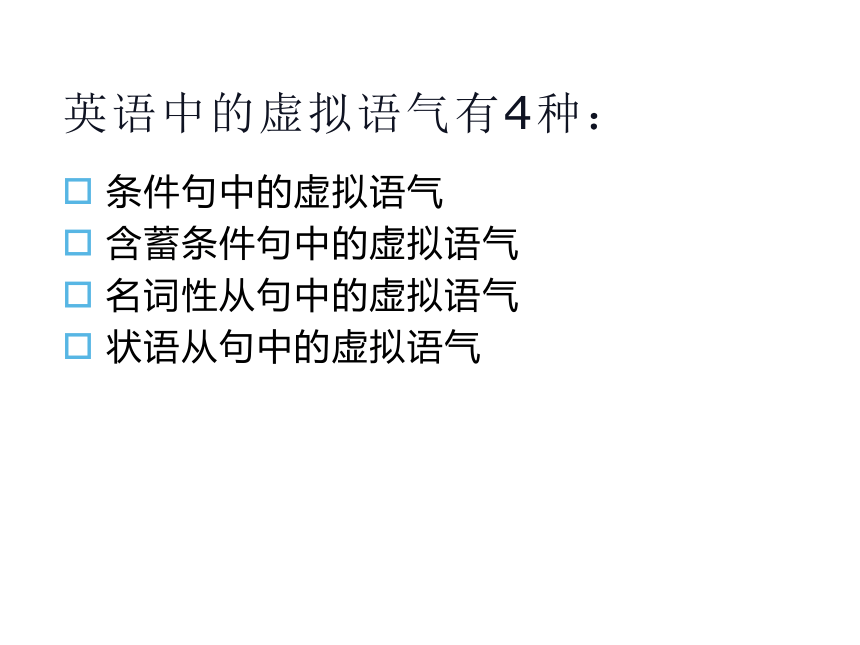 | |
| 格式 | pptx | ||
| 文件大小 | 188.6KB | ||
| 资源类型 | 教案 | ||
| 版本资源 | 通用版 | ||
| 科目 | 英语 | ||
| 更新时间 | 2023-01-12 20:27:19 | ||
图片预览

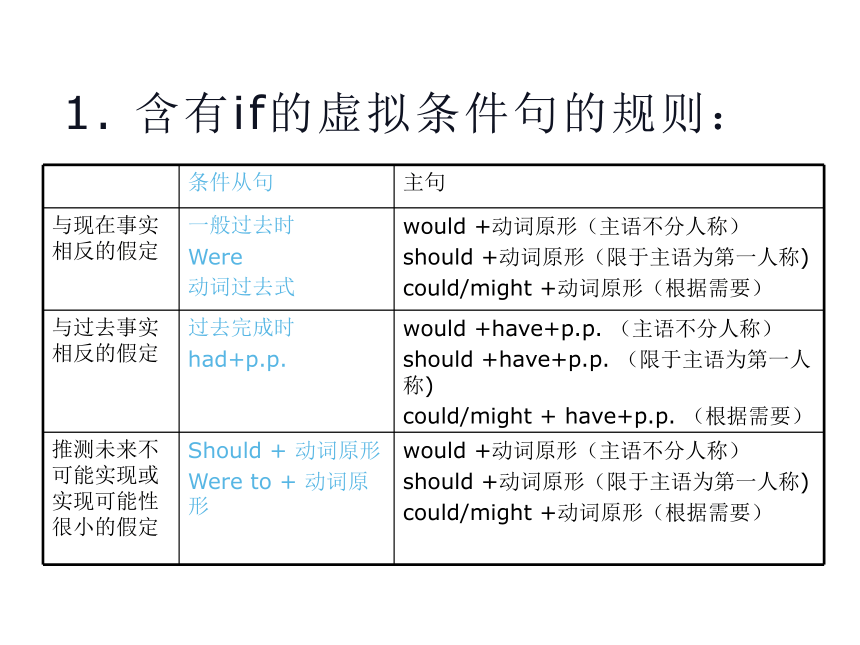
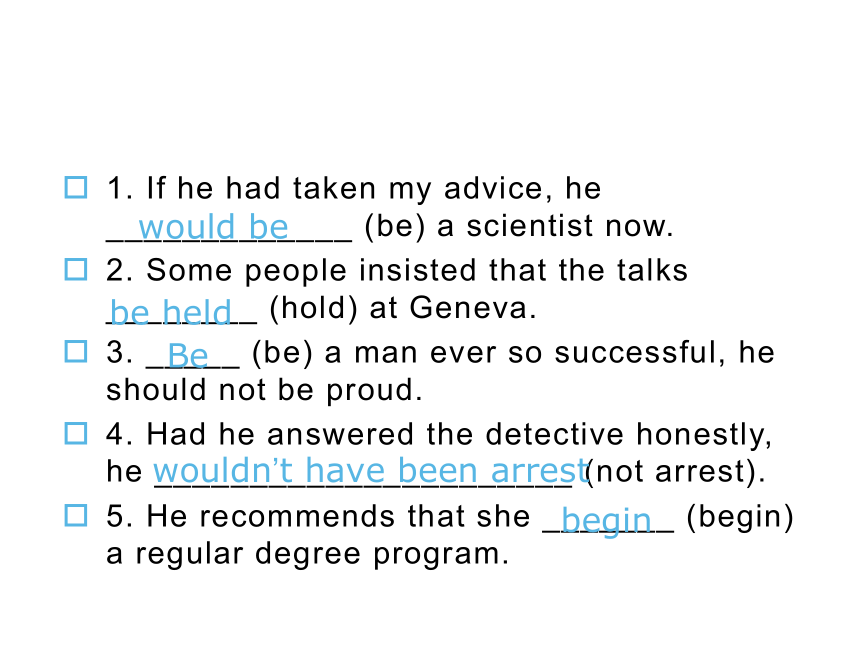
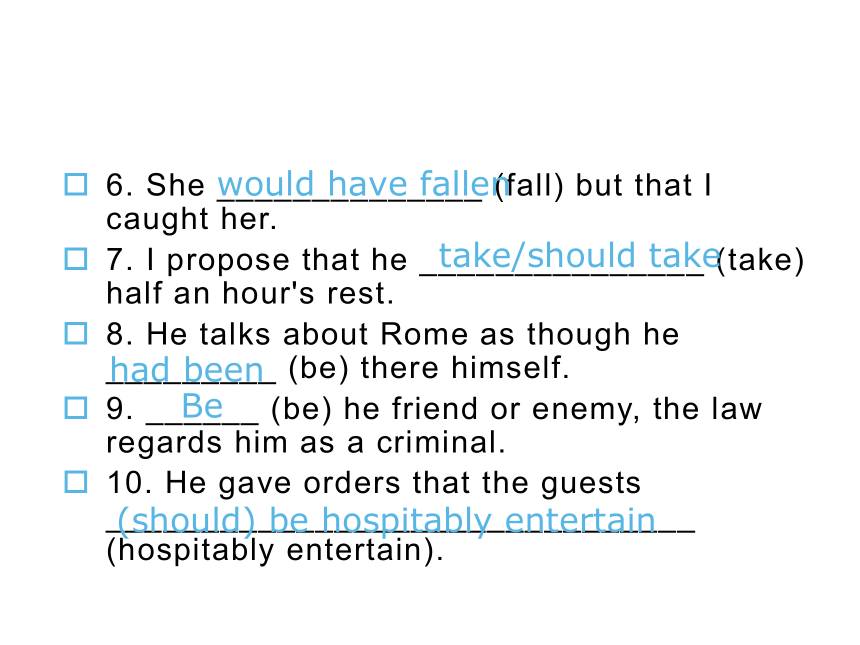
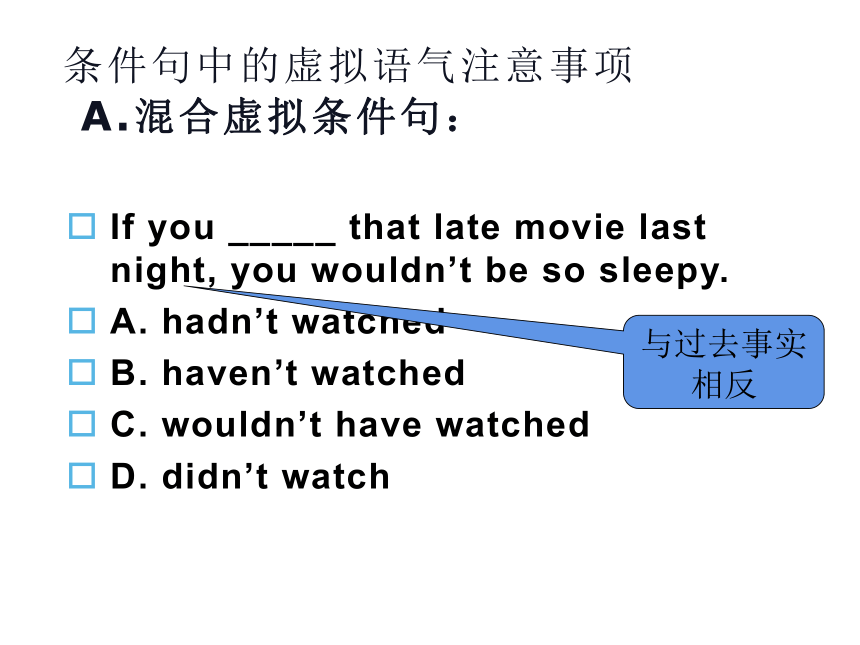
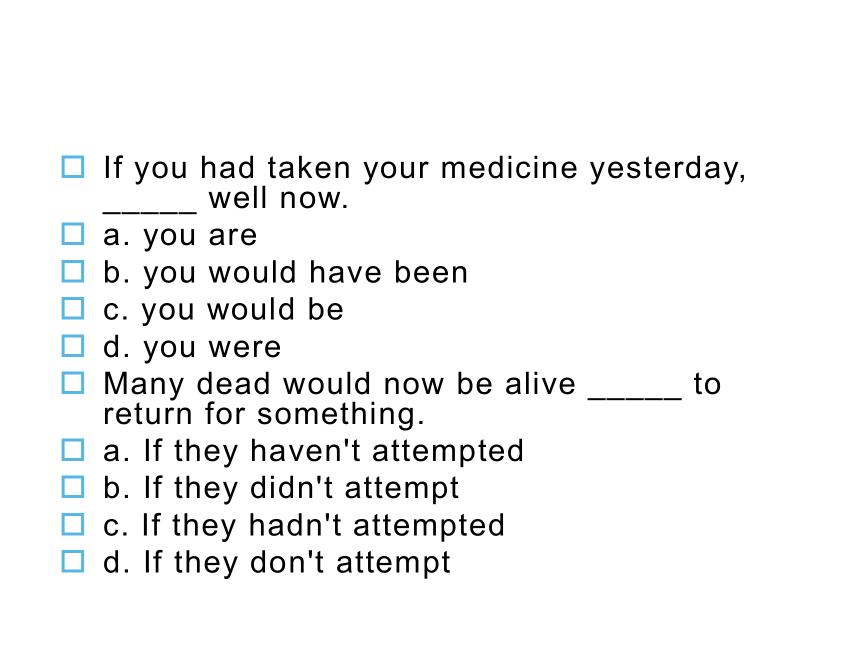
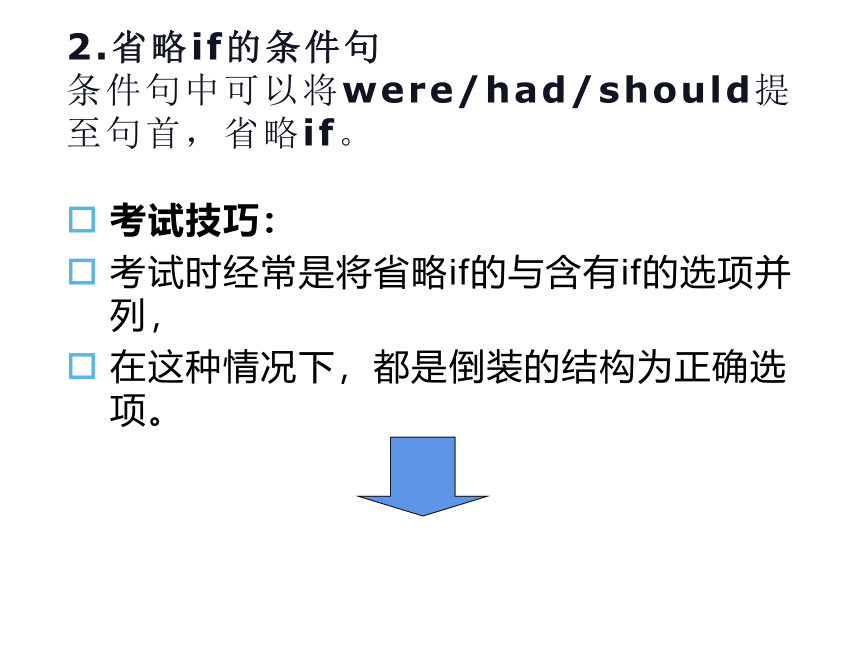
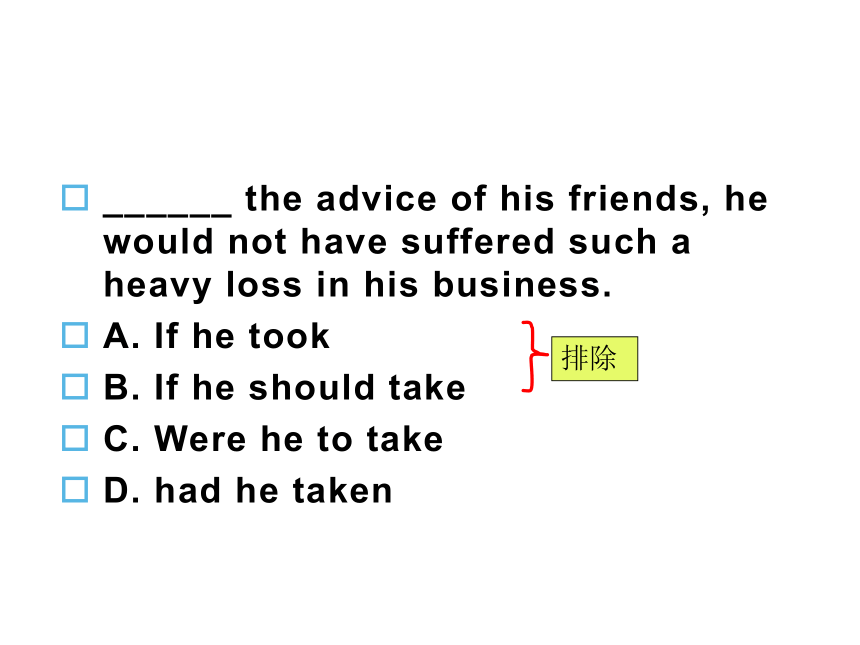
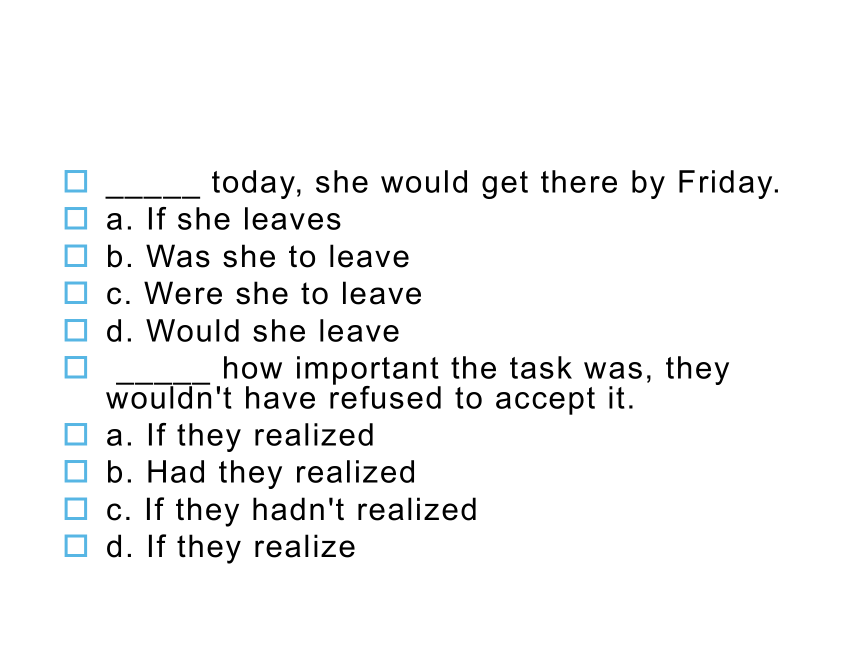
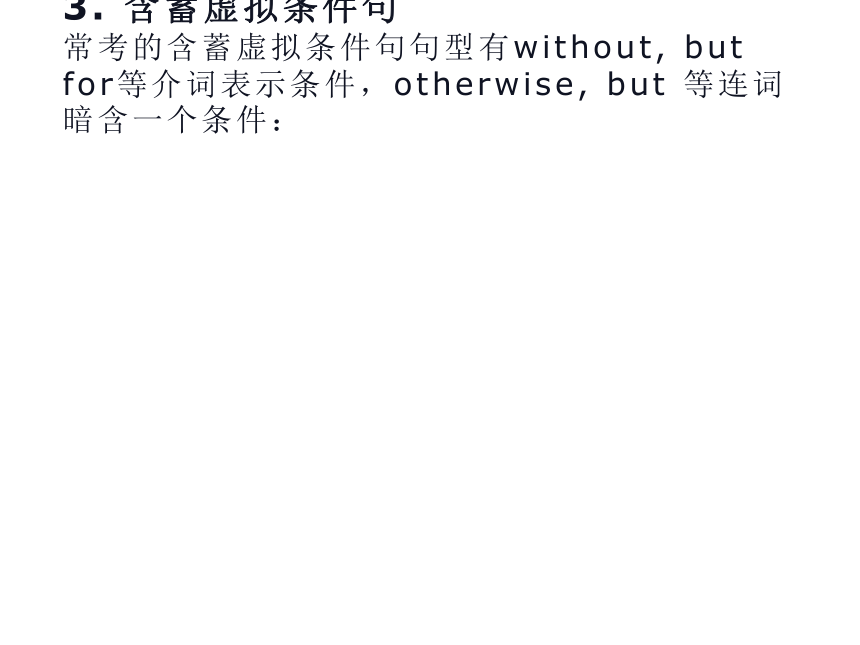
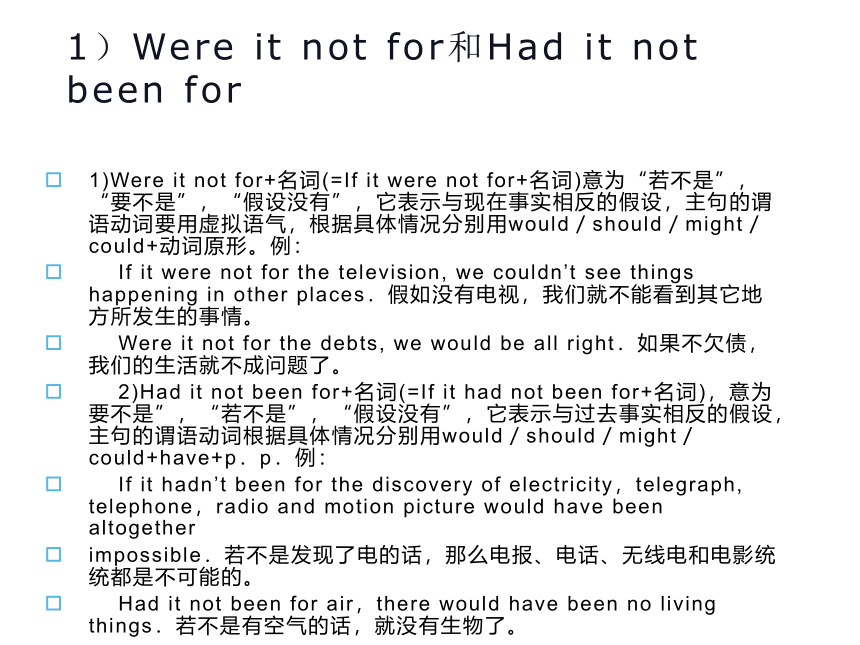
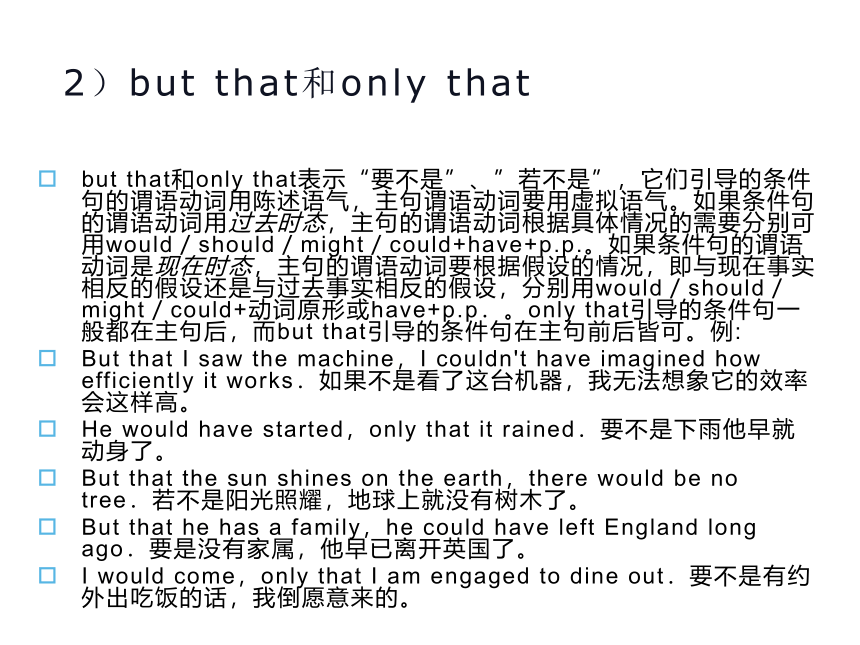
文档简介
(共42张PPT)
英语中的虚拟语气有4种:
条件句中的虚拟语气
含蓄条件句中的虚拟语气
名词性从句中的虚拟语气
状语从句中的虚拟语气
条件从句 主句
与现在事实相反的假定 一般过去时 Were 动词过去式 would +动词原形(主语不分人称)
should +动词原形(限于主语为第一人称)
could/might +动词原形(根据需要)
与过去事实相反的假定 过去完成时 had+p.p. would +have+p.p. (主语不分人称)
should +have+p.p. (限于主语为第一人称)
could/might + have+p.p. (根据需要)
推测未来不可能实现或实现可能性很小的假定 Should + 动词原形 Were to + 动词原形 would +动词原形(主语不分人称)
should +动词原形(限于主语为第一人称)
could/might +动词原形(根据需要)
1. 含有if的虚拟条件句的规则:
1. If he had taken my advice, he _____________ (be) a scientist now.
2. Some people insisted that the talks ________ (hold) at Geneva.
3. _____ (be) a man ever so successful, he should not be proud.
4. Had he answered the detective honestly, he ______________________ (not arrest).
5. He recommends that she _______ (begin) a regular degree program.
would be
be held
Be
wouldn’t have been arrest
begin
6. She ______________ (fall) but that I caught her.
7. I propose that he _______________ (take) half an hour's rest.
8. He talks about Rome as though he _________ (be) there himself.
9. ______ (be) he friend or enemy, the law regards him as a criminal.
10. He gave orders that the guests _______________________________ (hospitably entertain).
would have fallen
take/should take
had been
Be
(should) be hospitably entertain
条件句中的虚拟语气注意事项
A.混合虚拟条件句:
If you _____ that late movie last night, you wouldn’t be so sleepy.
A. hadn’t watched
B. haven’t watched
C. wouldn’t have watched
D. didn’t watch
与过去事实相反
If you had taken your medicine yesterday, _____ well now.
a. you are
b. you would have been
c. you would be
d. you were
Many dead would now be alive _____ to return for something.
a. If they haven't attempted
b. If they didn't attempt
c. If they hadn't attempted
d. If they don't attempt
2.省略if的条件句
条件句中可以将were/had/should提至句首,省略if。
考试技巧:
考试时经常是将省略if的与含有if的选项并列,
在这种情况下,都是倒装的结构为正确选项。
______ the advice of his friends, he would not have suffered such a heavy loss in his business.
A. If he took
B. If he should take
C. Were he to take
D. had he taken
排除
_____ today, she would get there by Friday.
a. If she leaves
b. Was she to leave
c. Were she to leave
d. Would she leave
_____ how important the task was, they wouldn't have refused to accept it.
a. If they realized
b. Had they realized
c. If they hadn't realized
d. If they realize
3. 含蓄虚拟条件句
常考的含蓄虚拟条件句句型有without, but for等介词表示条件,otherwise, but 等连词暗含一个条件:
1)Were it not for和Had it not been for
1)Were it not for+名词(=If it were not for+名词)意为“若不是”,“要不是”,“假设没有”,它表示与现在事实相反的假设,主句的谓语动词要用虚拟语气,根据具体情况分别用would/should/might/could+动词原形。例:
If it were not for the television, we couldn’t see things happening in other places.假如没有电视,我们就不能看到其它地方所发生的事情。
Were it not for the debts, we would be all right.如果不欠债,我们的生活就不成问题了。
2)Had it not been for+名词(=If it had not been for+名词),意为要不是”,“若不是”,“假设没有”,它表示与过去事实相反的假设,主句的谓语动词根据具体情况分别用would/should/might/could+have+p.p.例:
If it hadn’t been for the discovery of electricity,telegraph, telephone,radio and motion picture would have been altogether
impossible.若不是发现了电的话,那么电报、电话、无线电和电影统统都是不可能的。
Had it not been for air,there would have been no living things.若不是有空气的话,就没有生物了。
2)but that和only that
but that和only that表示“要不是”、”若不是”,它们引导的条件句的谓语动词用陈述语气,主句谓语动词要用虚拟语气。如果条件句的谓语动词用过去时态,主句的谓语动词根据具体情况的需要分别可用would/should/might/could+have+p.p.。如果条件句的谓语动词是现在时态,主句的谓语动词要根据假设的情况,即与现在事实相反的假设还是与过去事实相反的假设,分别用would/should/might/could+动词原形或have+p.p.。only that引导的条件句一般都在主句后,而but that引导的条件句在主句前后皆可。例:
But that I saw the machine,I couldn't have imagined how efficiently it works.如果不是看了这台机器,我无法想象它的效率会这样高。
He would have started,only that it rained.要不是下雨他早就动身了。
But that the sun shines on the earth,there would be no tree.若不是阳光照耀,地球上就没有树木了。
But that he has a family,he could have left England long ago.要是没有家属,他早已离开英国了。
I would come,only that I am engaged to dine out.要不是有约外出吃饭的话,我倒愿意来的。
He would have left but that he _____.
a. is afraid
b. was afraid
c. has been afraid
d. have been afraid
But that he has a family, _____ England long ago.
a. he left
b. he would leave
c. he would have left
d. he had left
3)其它连词引导的条件句
suppose, supposing (that),provided,unless, on condition that等连词引导的条件句的谓语动词既可用虚拟语气,也可用陈述语气,但是条件件句和主句的谓语动词的语气必须保持一致,例:
Supposing I didn’t agree,what would you do 要是我不同意;你会怎么办?
4)其他虚拟条件句的含蓄表达形式
有时候假设的条件不用条件从句来表达,而用介词短语、不定式、分词短语、比较级、连接词以及上下文含蓄地表达出来。尤其要注意:与otherwise,or,or else,but,and连用的含蓄条件句及but for;without;in the absence of等引导的条件状语,谓语动词要根据假设的具体情况确定用什么虚拟语气。
I didn’t know the extent of his difficulty(=If I had known the extent of his difficulty) or l would have promised to help him.那时我不知道他的困难程度,否则我会答应帮助他的。
Without heat and sunlight, plants on the earth ______ well.
A. would not grow
B. will not grow
C. had not grow
D. would not be grown
I _____ but I had no money.
a. would go abroad
b. would have gone abroad
c. go abroad
d. would be going abroad
I didn't know that he was a liar, or else I _____him.
a. wouldn't believe
b. didn't believe
c. wouldn't have believed
d. don't believe
I got caught in the traffic; ______I would have been here sooner.
a. anyway
b. however
c. although
d. otherwise
3.名词性从句中的虚拟语气
名词性从句包括主语从句、宾语从句、表语从句和同位语从句。若名词性从句表示建议、命令、要求,重要性、紧迫性,以及要求、愿望等,从句中的谓语动词常用虚拟语气,其构成为“(should)+动词原形”。
1. 主语从句中的表语为下列形容词或过去分词,则谓语动词采用上述形式的虚拟语气。
★表示重要性、合适性、必要性、强制性、义务性的形容词,常用的有important,advisable,necessary,natural,essential,imperative,vital,best,appropriate,urgent,desirable等。
★表示不可思议、惊讶、不可理解的形容词,如amazing,surprising,odd, strange,absurd,shocked,ridiculous,unthinkable等。
★表示命令、建议、要求、提议等动词的过去分词,如:ordered, suggested, demanded,requested,desired,recommended,required等。
It is necessary that he(should)be sent there at once.
有必要马上派他到那里去。
It is desired that we(should)preview our lesson before class.
希望我们在课前把课文预习好。
2. 在下列动词后的宾语从句中,谓语动词采用上述形式的虚拟语气。这类动词有:insist,determine,command,intend,propose,request,urge等。如:
Mike's uncle insists that he (should) not stay in this hotel.
迈克的叔叔坚决不留在这家旅馆里。
They requested that we (should) send a delegation to their country.
他们要求我们派一个代表团去他们国家。
3. 在下列名词后的同位语从句和表语从句中,谓语动词采用上述形式的虚拟语气。这类名词有:suggestion,decision,advice,order,preference,requirement等。如:
The dean's requirement is that all graduate students in education (should) pass CET6.
教务处长要求所有在校研究生都应通过大学英语六级考试。
He gave orders that guests(should) be hospitably entertained.
他下命令热情款待这些客人。
解题思路:
注意: 这类句型的考题中,一般都会有would, must等干扰项,正确选项以省略should者居多。
正确选项通常是下列形式中的一种:
do /be
not do
not be done
It is recommended that the project _____ until all the preparations have been made.
A. is not started
B. will not be started
C. not be started
D. is not to be started
答题技巧:选一个特殊的或少见的
4.其他句型中的虚拟语气
1) wish 后面的从句时态可以有三种情况。
I wish ____ to study mathematics years ago.
a. I could start
b. I can start
c. I started
d. I had started
2)在had hoped,had intended, had meant,had thought,had planned,had expected和had wanted等表示过去没有实现的希望或企图,要求它们后面的宾语从句中的谓语动词用would+动词原形。
I had hoped Mr. Smith would give me an early reply.我原本希望史密斯先生会早点给我回信。
She had expected you would come yesterday.她原指望你昨天会来的。
If only 表示愿望时与wish用法相同。
would rather (that) …用一般过去时。
It's (about/high) time that …用一般过去时
If only I _____ then what I knew afterwards!
a. know
b. knew
c. had known
d. would know
状语从句中的虚拟语气
方式状语从句中的虚拟语气:as if/though从句中的虚拟语气
He talks as though _____ where she was.
a. he knows
b. he know
c. he knew
d. he had known
He looks as if ______ a decent meal for a month.
a. he had
b. he didn't have
c. he hadn't had
d. he hasn't had
让步状语从句用虚拟语气
1)以be开头的虚拟语气让步句。
1)be+主语+ever so(=very)+形容词,+主句(用陈述语气)
Be it ever so late,I must do another experiment.尽管时间很晚了,我还得再做一个实验。
Home is home,be it ever so homely.不管多么简陋,家总是家。
1)以be开头的虚拟语气让步句。
2)be+主语+表语+or+表语,+主句(用陈述句语气)
Be he friend or enemy,the law regards him as a criminal.不管他是朋友还是敌人,法律认为他是罪犯。
All magnets behave the same,be they large or small.所有磁铁不论大小,其性质都一样。
1)以be开头的虚拟语气让步句。
3)be+名词/代词…+may/will
Be the weather what it may, I will go out.不管天气如何,我一定要出去。
_____ I will marry him all the same.
a. He is rich or poor,
b. Whether he was rich or poor,
c. Be he rich or poor,
d. If he is rich or poor,
2)though和although引导虚拟语气让步句。
1)让步从句的谓语用动词原形,表示一种纯粹的假设,主句用陈述语气,偶尔也用祈使语气。
Though everyone desert you,I will not (desert you).即使所有的人都背叛你,我也决不背叛你。
Although he be your brother,I don’t know him.虽然他是你的兄弟,但是我可不认识他。
I'll come down to them for a day at Christmas,though it be only for a day.我将于圣诞节到他们这里来呆上一天,虽然只有一天。
2)though和although引导虚拟语气让步句。
2)让步从句的谓语用were或should+动词原形,主句用陈述语气或用would/should/might+动词原形。
Though the whole world should condemn him,I will still believe in him.即使全世界都谴责他,我仍然相信他。
Though he should fail a hundred times in the experiment there would still be hope.即使他在该实验中失败一百次还是有希望的。
This gave me some faint hopes of relief,although I were not able to imagine how it could be brought about.这件事情使我获救有了一线希望,尽管我想不出它如何实现。
2)though和although引导虚拟语气让步句。
3)让步从句的谓语动词用had + p.p.或用should/could + have+ p.p.表示事情发生在过去的假设,主句用陈述语气或用would/should + have + p.p.
Jonas would have suspected him, though he had been a very model of probity.虽然他是诚实的典范,乔纳斯还是会怀疑他的。
Though he couldn't have said why,it made him feel uneasy.虽然他说不出原因,这仍然使他感到不安。
3)even if和even though引导虚拟语气让步句。
1)让步从句的谓语用were或用动词的过去时,表示与现在情况相 反的假设,主句的谓语动词用would/should + could/might+动词原形
Even though he were present,I wouldn't change my mind.即使他出席,我也不改变主意。
I couldn’t be angry with him even if I tried.即使我想试试,我也不能对他发脾气。
2)让步从句的谓语用过去完成时,即had + p.p.表示与过去的情况相反的假设,主句的谓语用would/should + have + p.p.
Even if it had been a rainy day,I should have gone to see him.即使那天是雨天,我也要去看他。
Even though she had been very busy, she would have helped us.即使她当时很忙,她还是会帮助我们的。
但是,如果even if引导的虚拟让步句,谓语含有should,were和had,可以省去连词even if,把should,were,had置于句首,即放在主语的前面。
Were the danger even greater,I should feel compelled to go.即使危险再大,我也觉得非去不可。
4)whether…or引导的虚拟让步句。
1)让步从句的谓语用动词原形,主句用陈述语气
Whether he succeed or fail, it will not matter to me.无论他成功还是失败,都与我无关。
2)让步从句的谓语用过去时,主句用陈述语气
Whether she were right or wrong,what is it to me 他对还是错,对我有什么关系
Everything around us , ______ air ,water or stone ,is matter.
a. whether it be
b. whether it will be
c. whether they are
d. whether they be
5)带ever的复合代词和连接副词引导虚拟语气让步句
带ever的复合代词和连接副词引导虚拟语气让步句,让步句的谓语用动词原形,主句用陈述语气。
Whatever be the reason,I shall be truly grateful.无论什么理由,我将真诚地感激。
Whichever be the case,her sister's situation remained the same.无论是哪种情况,她姐的处境都一样。
英语中的虚拟语气有4种:
条件句中的虚拟语气
含蓄条件句中的虚拟语气
名词性从句中的虚拟语气
状语从句中的虚拟语气
条件从句 主句
与现在事实相反的假定 一般过去时 Were 动词过去式 would +动词原形(主语不分人称)
should +动词原形(限于主语为第一人称)
could/might +动词原形(根据需要)
与过去事实相反的假定 过去完成时 had+p.p. would +have+p.p. (主语不分人称)
should +have+p.p. (限于主语为第一人称)
could/might + have+p.p. (根据需要)
推测未来不可能实现或实现可能性很小的假定 Should + 动词原形 Were to + 动词原形 would +动词原形(主语不分人称)
should +动词原形(限于主语为第一人称)
could/might +动词原形(根据需要)
1. 含有if的虚拟条件句的规则:
1. If he had taken my advice, he _____________ (be) a scientist now.
2. Some people insisted that the talks ________ (hold) at Geneva.
3. _____ (be) a man ever so successful, he should not be proud.
4. Had he answered the detective honestly, he ______________________ (not arrest).
5. He recommends that she _______ (begin) a regular degree program.
would be
be held
Be
wouldn’t have been arrest
begin
6. She ______________ (fall) but that I caught her.
7. I propose that he _______________ (take) half an hour's rest.
8. He talks about Rome as though he _________ (be) there himself.
9. ______ (be) he friend or enemy, the law regards him as a criminal.
10. He gave orders that the guests _______________________________ (hospitably entertain).
would have fallen
take/should take
had been
Be
(should) be hospitably entertain
条件句中的虚拟语气注意事项
A.混合虚拟条件句:
If you _____ that late movie last night, you wouldn’t be so sleepy.
A. hadn’t watched
B. haven’t watched
C. wouldn’t have watched
D. didn’t watch
与过去事实相反
If you had taken your medicine yesterday, _____ well now.
a. you are
b. you would have been
c. you would be
d. you were
Many dead would now be alive _____ to return for something.
a. If they haven't attempted
b. If they didn't attempt
c. If they hadn't attempted
d. If they don't attempt
2.省略if的条件句
条件句中可以将were/had/should提至句首,省略if。
考试技巧:
考试时经常是将省略if的与含有if的选项并列,
在这种情况下,都是倒装的结构为正确选项。
______ the advice of his friends, he would not have suffered such a heavy loss in his business.
A. If he took
B. If he should take
C. Were he to take
D. had he taken
排除
_____ today, she would get there by Friday.
a. If she leaves
b. Was she to leave
c. Were she to leave
d. Would she leave
_____ how important the task was, they wouldn't have refused to accept it.
a. If they realized
b. Had they realized
c. If they hadn't realized
d. If they realize
3. 含蓄虚拟条件句
常考的含蓄虚拟条件句句型有without, but for等介词表示条件,otherwise, but 等连词暗含一个条件:
1)Were it not for和Had it not been for
1)Were it not for+名词(=If it were not for+名词)意为“若不是”,“要不是”,“假设没有”,它表示与现在事实相反的假设,主句的谓语动词要用虚拟语气,根据具体情况分别用would/should/might/could+动词原形。例:
If it were not for the television, we couldn’t see things happening in other places.假如没有电视,我们就不能看到其它地方所发生的事情。
Were it not for the debts, we would be all right.如果不欠债,我们的生活就不成问题了。
2)Had it not been for+名词(=If it had not been for+名词),意为要不是”,“若不是”,“假设没有”,它表示与过去事实相反的假设,主句的谓语动词根据具体情况分别用would/should/might/could+have+p.p.例:
If it hadn’t been for the discovery of electricity,telegraph, telephone,radio and motion picture would have been altogether
impossible.若不是发现了电的话,那么电报、电话、无线电和电影统统都是不可能的。
Had it not been for air,there would have been no living things.若不是有空气的话,就没有生物了。
2)but that和only that
but that和only that表示“要不是”、”若不是”,它们引导的条件句的谓语动词用陈述语气,主句谓语动词要用虚拟语气。如果条件句的谓语动词用过去时态,主句的谓语动词根据具体情况的需要分别可用would/should/might/could+have+p.p.。如果条件句的谓语动词是现在时态,主句的谓语动词要根据假设的情况,即与现在事实相反的假设还是与过去事实相反的假设,分别用would/should/might/could+动词原形或have+p.p.。only that引导的条件句一般都在主句后,而but that引导的条件句在主句前后皆可。例:
But that I saw the machine,I couldn't have imagined how efficiently it works.如果不是看了这台机器,我无法想象它的效率会这样高。
He would have started,only that it rained.要不是下雨他早就动身了。
But that the sun shines on the earth,there would be no tree.若不是阳光照耀,地球上就没有树木了。
But that he has a family,he could have left England long ago.要是没有家属,他早已离开英国了。
I would come,only that I am engaged to dine out.要不是有约外出吃饭的话,我倒愿意来的。
He would have left but that he _____.
a. is afraid
b. was afraid
c. has been afraid
d. have been afraid
But that he has a family, _____ England long ago.
a. he left
b. he would leave
c. he would have left
d. he had left
3)其它连词引导的条件句
suppose, supposing (that),provided,unless, on condition that等连词引导的条件句的谓语动词既可用虚拟语气,也可用陈述语气,但是条件件句和主句的谓语动词的语气必须保持一致,例:
Supposing I didn’t agree,what would you do 要是我不同意;你会怎么办?
4)其他虚拟条件句的含蓄表达形式
有时候假设的条件不用条件从句来表达,而用介词短语、不定式、分词短语、比较级、连接词以及上下文含蓄地表达出来。尤其要注意:与otherwise,or,or else,but,and连用的含蓄条件句及but for;without;in the absence of等引导的条件状语,谓语动词要根据假设的具体情况确定用什么虚拟语气。
I didn’t know the extent of his difficulty(=If I had known the extent of his difficulty) or l would have promised to help him.那时我不知道他的困难程度,否则我会答应帮助他的。
Without heat and sunlight, plants on the earth ______ well.
A. would not grow
B. will not grow
C. had not grow
D. would not be grown
I _____ but I had no money.
a. would go abroad
b. would have gone abroad
c. go abroad
d. would be going abroad
I didn't know that he was a liar, or else I _____him.
a. wouldn't believe
b. didn't believe
c. wouldn't have believed
d. don't believe
I got caught in the traffic; ______I would have been here sooner.
a. anyway
b. however
c. although
d. otherwise
3.名词性从句中的虚拟语气
名词性从句包括主语从句、宾语从句、表语从句和同位语从句。若名词性从句表示建议、命令、要求,重要性、紧迫性,以及要求、愿望等,从句中的谓语动词常用虚拟语气,其构成为“(should)+动词原形”。
1. 主语从句中的表语为下列形容词或过去分词,则谓语动词采用上述形式的虚拟语气。
★表示重要性、合适性、必要性、强制性、义务性的形容词,常用的有important,advisable,necessary,natural,essential,imperative,vital,best,appropriate,urgent,desirable等。
★表示不可思议、惊讶、不可理解的形容词,如amazing,surprising,odd, strange,absurd,shocked,ridiculous,unthinkable等。
★表示命令、建议、要求、提议等动词的过去分词,如:ordered, suggested, demanded,requested,desired,recommended,required等。
It is necessary that he(should)be sent there at once.
有必要马上派他到那里去。
It is desired that we(should)preview our lesson before class.
希望我们在课前把课文预习好。
2. 在下列动词后的宾语从句中,谓语动词采用上述形式的虚拟语气。这类动词有:insist,determine,command,intend,propose,request,urge等。如:
Mike's uncle insists that he (should) not stay in this hotel.
迈克的叔叔坚决不留在这家旅馆里。
They requested that we (should) send a delegation to their country.
他们要求我们派一个代表团去他们国家。
3. 在下列名词后的同位语从句和表语从句中,谓语动词采用上述形式的虚拟语气。这类名词有:suggestion,decision,advice,order,preference,requirement等。如:
The dean's requirement is that all graduate students in education (should) pass CET6.
教务处长要求所有在校研究生都应通过大学英语六级考试。
He gave orders that guests(should) be hospitably entertained.
他下命令热情款待这些客人。
解题思路:
注意: 这类句型的考题中,一般都会有would, must等干扰项,正确选项以省略should者居多。
正确选项通常是下列形式中的一种:
do /be
not do
not be done
It is recommended that the project _____ until all the preparations have been made.
A. is not started
B. will not be started
C. not be started
D. is not to be started
答题技巧:选一个特殊的或少见的
4.其他句型中的虚拟语气
1) wish 后面的从句时态可以有三种情况。
I wish ____ to study mathematics years ago.
a. I could start
b. I can start
c. I started
d. I had started
2)在had hoped,had intended, had meant,had thought,had planned,had expected和had wanted等表示过去没有实现的希望或企图,要求它们后面的宾语从句中的谓语动词用would+动词原形。
I had hoped Mr. Smith would give me an early reply.我原本希望史密斯先生会早点给我回信。
She had expected you would come yesterday.她原指望你昨天会来的。
If only 表示愿望时与wish用法相同。
would rather (that) …用一般过去时。
It's (about/high) time that …用一般过去时
If only I _____ then what I knew afterwards!
a. know
b. knew
c. had known
d. would know
状语从句中的虚拟语气
方式状语从句中的虚拟语气:as if/though从句中的虚拟语气
He talks as though _____ where she was.
a. he knows
b. he know
c. he knew
d. he had known
He looks as if ______ a decent meal for a month.
a. he had
b. he didn't have
c. he hadn't had
d. he hasn't had
让步状语从句用虚拟语气
1)以be开头的虚拟语气让步句。
1)be+主语+ever so(=very)+形容词,+主句(用陈述语气)
Be it ever so late,I must do another experiment.尽管时间很晚了,我还得再做一个实验。
Home is home,be it ever so homely.不管多么简陋,家总是家。
1)以be开头的虚拟语气让步句。
2)be+主语+表语+or+表语,+主句(用陈述句语气)
Be he friend or enemy,the law regards him as a criminal.不管他是朋友还是敌人,法律认为他是罪犯。
All magnets behave the same,be they large or small.所有磁铁不论大小,其性质都一样。
1)以be开头的虚拟语气让步句。
3)be+名词/代词…+may/will
Be the weather what it may, I will go out.不管天气如何,我一定要出去。
_____ I will marry him all the same.
a. He is rich or poor,
b. Whether he was rich or poor,
c. Be he rich or poor,
d. If he is rich or poor,
2)though和although引导虚拟语气让步句。
1)让步从句的谓语用动词原形,表示一种纯粹的假设,主句用陈述语气,偶尔也用祈使语气。
Though everyone desert you,I will not (desert you).即使所有的人都背叛你,我也决不背叛你。
Although he be your brother,I don’t know him.虽然他是你的兄弟,但是我可不认识他。
I'll come down to them for a day at Christmas,though it be only for a day.我将于圣诞节到他们这里来呆上一天,虽然只有一天。
2)though和although引导虚拟语气让步句。
2)让步从句的谓语用were或should+动词原形,主句用陈述语气或用would/should/might+动词原形。
Though the whole world should condemn him,I will still believe in him.即使全世界都谴责他,我仍然相信他。
Though he should fail a hundred times in the experiment there would still be hope.即使他在该实验中失败一百次还是有希望的。
This gave me some faint hopes of relief,although I were not able to imagine how it could be brought about.这件事情使我获救有了一线希望,尽管我想不出它如何实现。
2)though和although引导虚拟语气让步句。
3)让步从句的谓语动词用had + p.p.或用should/could + have+ p.p.表示事情发生在过去的假设,主句用陈述语气或用would/should + have + p.p.
Jonas would have suspected him, though he had been a very model of probity.虽然他是诚实的典范,乔纳斯还是会怀疑他的。
Though he couldn't have said why,it made him feel uneasy.虽然他说不出原因,这仍然使他感到不安。
3)even if和even though引导虚拟语气让步句。
1)让步从句的谓语用were或用动词的过去时,表示与现在情况相 反的假设,主句的谓语动词用would/should + could/might+动词原形
Even though he were present,I wouldn't change my mind.即使他出席,我也不改变主意。
I couldn’t be angry with him even if I tried.即使我想试试,我也不能对他发脾气。
2)让步从句的谓语用过去完成时,即had + p.p.表示与过去的情况相反的假设,主句的谓语用would/should + have + p.p.
Even if it had been a rainy day,I should have gone to see him.即使那天是雨天,我也要去看他。
Even though she had been very busy, she would have helped us.即使她当时很忙,她还是会帮助我们的。
但是,如果even if引导的虚拟让步句,谓语含有should,were和had,可以省去连词even if,把should,were,had置于句首,即放在主语的前面。
Were the danger even greater,I should feel compelled to go.即使危险再大,我也觉得非去不可。
4)whether…or引导的虚拟让步句。
1)让步从句的谓语用动词原形,主句用陈述语气
Whether he succeed or fail, it will not matter to me.无论他成功还是失败,都与我无关。
2)让步从句的谓语用过去时,主句用陈述语气
Whether she were right or wrong,what is it to me 他对还是错,对我有什么关系
Everything around us , ______ air ,water or stone ,is matter.
a. whether it be
b. whether it will be
c. whether they are
d. whether they be
5)带ever的复合代词和连接副词引导虚拟语气让步句
带ever的复合代词和连接副词引导虚拟语气让步句,让步句的谓语用动词原形,主句用陈述语气。
Whatever be the reason,I shall be truly grateful.无论什么理由,我将真诚地感激。
Whichever be the case,her sister's situation remained the same.无论是哪种情况,她姐的处境都一样。
